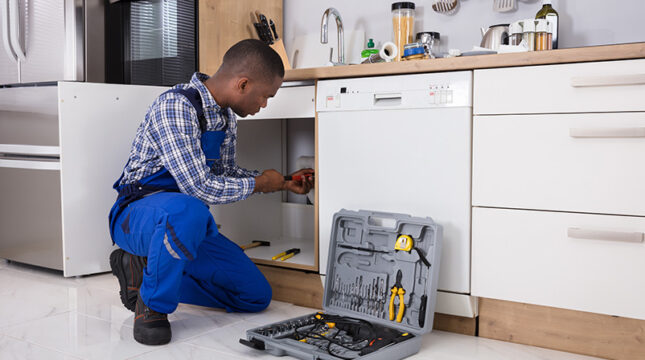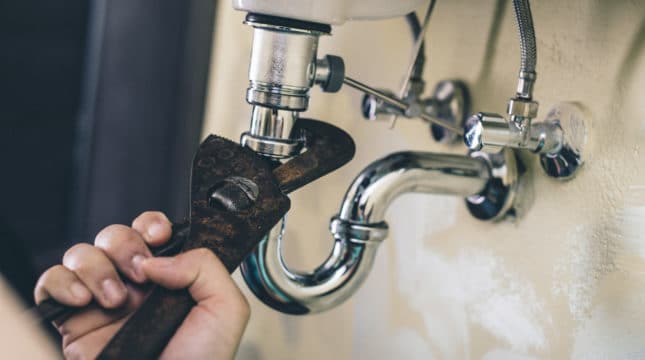How to get an NC plumbers license
All plumbers must have a license issued by the North Carolina State Board of Examiners of Plumbing, Heating and Fire Sprinkler Contractors. Follow these four steps to get your North Carolina plumbing license:
1. Choose your license classification
Each of these allows North Carolina plumbers to pursue a specific scope of work:
- Plumbing class I contractor (P-I). Potable water and drain/waste/vent piping systems in any building (residential, commercial, industrial).
- Plumbing class contractor II (P-II). Potable water and drain/waste/vent piping systems in single-family detached dwellings only.
- Restricted limited plumbing contractor (RLP). Exterior building sewer piping, exterior water service piping 2″ or less, exterior backflow preventers on 2″ or less piping, and water filtration systems.
- Plumbing technician. Potable water and drain/waste/vent piping systems. Must be a sublicensee of a P-I, P-II or RLP contractor.
Additionally, specific plumbing licenses are available for technicians at private education institutions and state or local government technicians.
2. Complete your application
Along with your application, you’ll need to submit the following documents:
- W-2 and/or 1099 forms for your previous plumbing work
- Notarized work experience verification and employment history forms
- Printed copy of your criminal background check from Castlebranch
- Statement describing at any criminal history, if applicable
- Check or money order for the $100 exam fee
3. Take the plumbing exam
After the state licensing board approves your North Carolina plumber license application, you’ll receive instructions on scheduling your licensing exam. You must take the exam within 30 days of your application’s approval.
The number and length of exams you must take depends on the type of license you are applying for:
- P-I contractor: Technical exam (4 hours) and business and law exam (1.5) hours
- P-II contractor: Technical exam (4 hours) and business and law exam (1.5) hours
- RLP contractor: Technical exam (2 hours) and business and law exam (1.5) hours
- Plumbing technician: Technical exam (4 hours)
You may use approved reference materials during the open-book exam. The exams are administered on-site at Asheville, Charlotte, Winston-Salem, Raleigh, Fayetteville, Greenville and Wilmington testing centers. You’ll receive the results at the testing location on the day of your exam.
4. Submit a license activation form
Within 45 days of passing the exam, you must submit a license activation form along with a check or money order for the appropriate licensing fee:
- P-I contractor: $150
- P-II contractor: $150
- RLP contractor: $150
- Plumbing technician: $75
North Carolina plumbers license requirements
You must fulfill specific work experience requirements to apply for your North Carolina plumber license:
P-I or P-II contractor license
You must have two years (4,000 hours) of hands-on experience in plumbing systems installation, maintenance, service or repair. You may substitute directly related academic or technical training for up to one-half (2,000 hours) of the experience requirement.
RLP contractor license
You must have nine months (1,500 hours) of hands-on experience in plumbing systems installation, maintenance, service or repair. You may substitute directly related academic or technical training for up to one-half (750 hours) of the experience requirement.
Plumbing technician license
You must have 18 months (3,000 hours) of hands-on experience in plumbing systems installation, maintenance, service or repair.
Insurance for North Carolina plumbers
Once you receive your license, you may want to get plumber insurance to help protect your work. The following list includes the types of North Carolina business insurance available for licensed plumbers.
Workers’ compensation insurance
According to the North Carolina Workers’ Compensation Act, employers in this state must have workers’ compensation insurance if they have three or more employees. If you or one of your employees gets hurt on the job, this type of insurance can help cover lost wages, medical costs and more.
General liability insurance
General liability insurance can help cover certain types of accidents, like damage to a client’s property or a third-party injury.
Tools and equipment insurance
If someone damages or steals your work gear, tools and equipment insurance can help cover repairs or replacements.
Commercial auto insurance
If you drive for work, commercial auto insurance can help provide coverage for accident-related costs, such as property damage and medical bills.
Commercial property insurance
Commercial property insurance can help provide coverage for damage or vandalism to a property you own or rent, along with any inventory or equipment stored there.
Requirements for NC plumbers license renewal
Licenses expire each year on December 31. There are no continuing education requirements. To renew your license, submit a renewal form along with the appropriate renewal fee:
- P-I contractor: $150
- P-II contractor: $150
- RLP contractor: $150
- Plumbing technician: $75
Plumbers license reciprocity in North Carolina
North Carolina’s State Board of Examiners of Plumbing, Heating and Fire Sprinkler Contractors does not have reciprocity agreements with any other state. Regardless of past experience or licensure in other locations, you must meet North Carolina’s requirements and pass the necessary exam(s) to obtain a plumbing license in this state.
The State Board does allow one exception for applicants with a current residential plumbing contractor license in South Carolina pursuing a P-II license in North Carolina. These individuals may apply for a waiver that exempts them from taking the technical portion of the exam. They must still meet all other licensing requirements.
How NEXT helps support North Carolina plumbers
Whether you need small business insurance or self-employed plumber insurance, NEXT can help you find the right coverage to protect your professional work.
Apply online, get a quote and obtain a certificate of insurance in under 10 minutes from any computer or mobile device.
If you have questions, our licensed, U.S.-based insurance professionals are available to help.
Start a free quote with NEXT.






